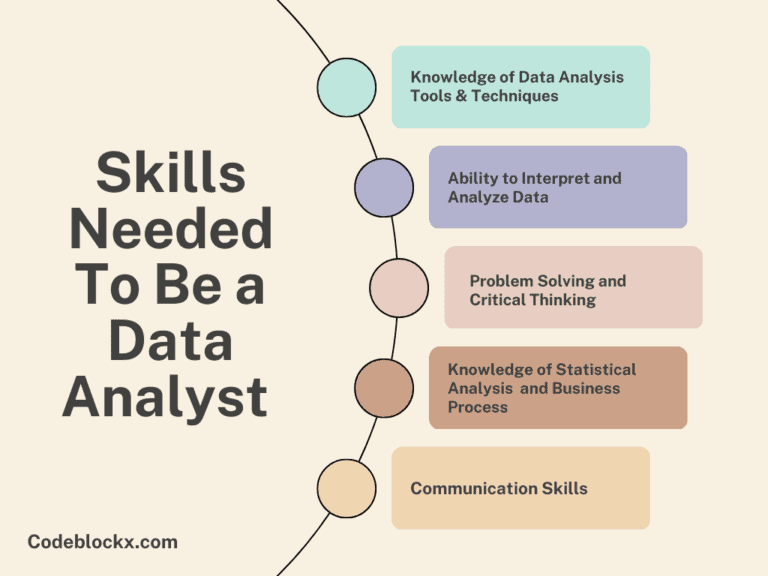Data analysis is a rapidly growing field, and the demand for qualified professionals in this area is continuously increasing. A professional data analyst needs to have a good understanding of the tools available to analyze and interpret data, as well as the applied statistical methods.
Data analysis is an important process that provides a means to convert data into meaningful and actionable insights. Organizations rely on data analysis to identify trends, uncover insights, and make sound decisions that affect the success of the organization.

Data analysts need to have knowledge of the industry and the data, as well as experience with data analysis software and techniques. Data analysts can work in a variety of fields, from finance to marketing, and from healthcare to retailing.
This article will provide an in-depth look at the role of a data analyst, and what it takes to become one. It will discuss the skills and knowledge required to excel in this field. Furthermore, it will provide some tips on how to build a professional profile that will give you an advantage over other aspiring data analysts out there.
What is a Data Analyst?
A data analyst is a professional who is tasked with using data to determine trends and insights that can be used to make informed decisions. Data analysts have an understanding of the data they are analyzing and can create visual reports, uncover hidden patterns, and identify correlations between different data sets.
Data analysts also help define rules and criteria for data evaluation and use different methods to forecast outcomes. They are also responsible for creating dashboards and reports that showcase findings in an easy-to-digest format.
Data analysts work in a variety of industries including finance, healthcare, marketing, and retailing. Generally, data analysts rely on computer programs to gather and analyze data, but they also need to be able to effectively communicate their findings to decision-makers.
What are the Skills Needed To Be a Data Analyst?
Data analysis requires more than just basic computer skills, and the successful data analyst needs to possess the following skills:
a) Knowledge of Data Analysis Tools and Techniques
The first step to being a successful data analyst is to have a strong understanding of the various tools and techniques used in the data analysis process. This includes software programs like SAS and R, as well as learning coding languages such as Python and SQL. It is also important to understand different kinds of data visualization, processing, and data mining techniques.
b) Ability to Analyze and Interpret Data
Data analysts need to be able to analyze and interpret data, including the identification of patterns, correlations, and trends. They must also be able to accurately identify problems, anomalies, and outliers in the data set. It is beneficial for the data analyst to have experience in conducting data analysis and identifying problems in large or complex data sets.

c) Problem-Solving and Critical Thinking
To be effective data analysts, analysts must have excellent problem-solving and critical-thinking skills. They must be able to draw meaningful and accurate conclusions from the data they have analyzed, and think on their feet to come up with suitable solutions.
d) Knowledge of Statistical Analysis
Data analysts must have a good understanding of the principles of statistical analysis to effectively analyze the data they have collected. They must know descriptive statistics, probability theory, and/or regression methods, as well as experience in using different statistical tools to uncover insights.
e) Knowledge of Business Processes
Data analysts need to have an understanding of the different business processes that are related to their data analysis objectives. As such, having an understanding of the different business units within an organization and their functions is essential.
f) Communication Skills
Data analysts must have great communication skills, as their reports and recommendations will be used to make important decisions for an organization. The data analyst needs to be able to explain their analysis effectively and understandably.
How to Obtain the Necessary Knowledge?
Now that you understand the skills and knowledge necessary to be a data analyst, let’s look at the steps you need to take to obtain that knowledge. There are a few approaches you can take to learn the information you need for a career as a data analyst:
a) Self-Learning
Often, the best way to learn the language and techniques of data analysis is to practice them yourself. You can explore tutorials, websites, and books to learn more about the data analysis process. Additionally, you can use online courses, such as those available from Coursera and Udemy, to learn more about data analysis.
b) University Programs
You may also want to consider enrolling in a university program dedicated to data analysis. Such programs will often teach the foundational concepts of data analysis, as well as provide more in-depth information on specific topics such as data mining, data visualization, and predictive analytics.
c) Professional Training Courses
If you are looking to take your data analysis skills to the next level, you may want to consider professional training courses. These courses can provide valuable insights into the application of data analysis in a real-world environment. Professional courses may also provide you with certifications that will help you stand out in a competitive job market.
It is important to become proficient in the various tools, languages, and techniques used in data analysis. If you can show potential employers that you have the necessary knowledge, you will be one step closer to finding a job as a data analyst.

How to Build a Professional Data Analyst Profile?
To make you stand out from other aspiring data analysts, it is important to build a professional profile that showcases all your skills and abilities. Some steps you can take for this are:
a) Create an Online Portfolio
Creating an online portfolio is a great way to showcase your experience, qualifications, and skills. Your portfolio should include numerous examples of the reports and insights you have created with data analysis. This is a great way to show potential employers what you are capable of and what you can bring to the organization.
b) Become a Member of a Professional Organization
Connecting with other data analysts is a great way to stay abreast of the latest tools, techniques, and strategies. Joining a professional organization such as the International Institute for Analytics, the Data Science Council of America, or the World Wide Web Consortium will put you in touch with professionals in the same field and provide you with numerous resources.
c) Participate in Industry Events
Participation in industry events and conferences is a great way to network and learn from the best in the business. It allows you to learn from experts in the field and is also a great way to show potential employers your commitment to the field.
d) Showcase Your Skills on Social Media
Social media can be a powerful tool to showcase your skills and knowledge. You can start a blog, create video tutorials, and join communities dedicated to data analysis. This is a great way to spread your knowledge and show potential employers your knowledge and enthusiasm.
Creating a strong online presence is essential in a competitive field such as data analysis. Taking the time to create a professional profile will help you stand out from the competition and give you an edge in the job market.
How To Become A Data Analyst?
Now that you understand the skills and knowledge required to become a data analyst, and how to build a professional profile, let’s look at some of the steps necessary to become one.
a) Gain Experience
One of the best ways to gain experience as a data analyst is to take on internships or volunteer to work with a data analyst. These experiences will help you gain the necessary knowledge and skills, and will allow you to put your knowledge into practice. Furthermore, some organizations might even offer to hire you full-time once you have completed your internship.
b) Start an Entry Level Position
Entry-level positions are great ways to get a foot in the door in the data analytics field. These positions may require only one or two years of experience, so they can provide an excellent starting point for those starting in the field of data analysis.
c) Join a Professional Organization
As mentioned before, joining a professional organization is a great way to stay up to date-in the constantly evolving field of data analytics. Professional organizations can keep you informed of leading tools, techniques, and strategies, as well as provide you with invaluable resources.

d) Take Courses
Continuing your education is essential for keeping your data analysis knowledge and skills up to date. You can take any number of courses available from universities, online training providers, and even self-learning resources. These courses can provide you with new skills and knowledge to use in the field of data analysis.
e) Research and Network
It is important to stay up to date on the latest trends, tools, and techniques in the data analytics field. You can do this by reading blogs, articles, and other resources on data analysis. Additionally, networking with other data analysts is a great way to exchange ideas, get feedback and advice, and build relationships.
f) Certifications
Certifications are a great way to demonstrate your expertise and knowledge in a specific area of data analysis. They provide evidence that you have met certain standards in the field, and can also provide you with an edge when applying for jobs.
Following these steps will help you develop a successful career in data analysis. Furthermore, having a well-rounded set of skills and knowledge will help provide you with the necessary tools to go above and beyond in the field.
What Different Roles Can a Data Analyst Have?
Data analysts can work in many different roles, depending on their skills and expertise. Some of the roles available to data analysts include:
a) Machine Learning Engineer
Machine Learning Engineers are responsible for deploying machine learning algorithms and models to solve data science problems. They are also responsible for developing new models and techniques for data analysis and interpretation.
b) Business Intelligence Engineer
Business Intelligence Engineers apply data analysis techniques and tools to gain insights from large data sets and to identify trends in business operations. They analyze data from multiple sources, such as databases, transaction logs, and customer feedback forms.
c) Data Scientist
Data Scientists apply data analysis techniques to gain insights from data and to build models to support organizational decisions. They use algorithms and software tools to identify patterns, forecast outcomes, and identify problem areas.
d) Data Visualization Engineer
Data Visualization Engineers create graphical representations of data sets, to make the data easier to understand and interpret. They develop data visualizations using tools, such as Tableau, that help to capture and showcase insights.
e) Data Engineer
Data Engineers are responsible for the design and development of data architectures, including the design of databases, ETL processes, and reporting solutions. They need to have a good understanding of the data models, principles, and industry best practices for data engineering.

f) Business Analyst
Business Analysts use data analysis to provide solutions to business problems. They use data-driven insights to make decisions and find ways to optimize business operations. They may also participate in the design and implementation of data warehouses and identify opportunities to utilize analytics tools.
These are just a few of the many roles that data analysts can have in an organization. Depending on your skills and experience, you may be able to specialize in one or more of these roles.
What is the Market Like for Data Analysts?
The global demand for qualified data analysts continues to grow, and there are numerous opportunities for data analysts in all industries. Over the past few years, there has been an increasing demand for data analysts in the areas of finance, healthcare, and retailing.
Furthermore, with the continuously increasing demand for data analysis, the salaries for data analysts continue to rise. Not only do data analysts make good money, but they also enjoy interesting, challenging, and rewarding careers.
Conclusion
Data Analysis is an increasingly important and in-demand field. Data analysts are often able to provide organizations with valuable insights, which can help them improve operations, develop better strategies, and make more informed decisions.
If you have the necessary skills and knowledge, then you can have a successful and rewarding career as a data analyst. This article provided you with an in-depth look at the steps you need to take to pursue a successful career as a data analyst.
Data analysis is an important tool that is here to stay. With the right knowledge and skills, you can have a successful career as a data analyst.